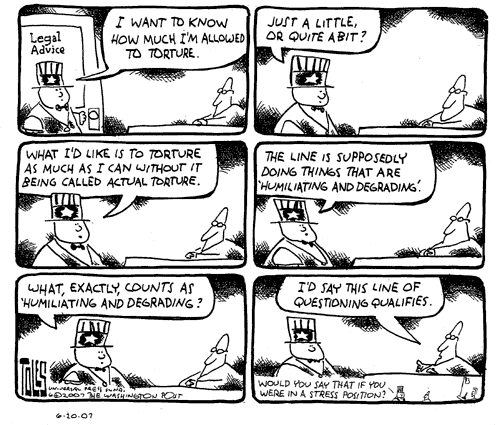Monday, June 25, 2007
IHT: 'Most severely wounded' soldier endures: blind, quadriplegic, struggling to breathe

TAMPA, Florida: He lies flat, unseeing eyes fixed on the ceiling, tubes and machines feeding him, breathing for him, keeping him alive. He cannot walk or talk, but he can grimace and cry. And he is fully aware of what has happened to him.
Four years ago almost to this day, Joseph Briseno Jr. was shot in the back of the head at point-blank range in a Baghdad marketplace. His spinal cord was shattered, and cardiac arrests stole his vision and damaged his brain.
The 24-year-old is one of the most severely injured soldiers — some think the most injured soldier — to survive.
"Three things you would not want to be: blind, head injury, and paralyzed from the neck down. That's tough," said Dr. Steven Scott, head of the Polytrauma Rehabilitation Center at the Tampa VA Medical Center, where Briseno has twice been hospitalized for extensive care. In recent days, Briseno was hospitalized yet again, this time at the Washington, D.C., VA Medical Center.
As a high schooler, Briseno liked the Discovery Channel and CSI, and wanted to be a forensic scientist or investigator. He was 20, attending George Mason University, when he was called up from the reserves and sent to war.
After he was shot, he was flown to Kuwait and then to a military hospital in Landstuhl, Germany. His parents and two sisters rushed to his side.
"They told us, 'Prepare for his service.' That's how bad he was," said his father, Joseph Briseno Sr., a retired career Army man.
But he survived. From Germany, he went to Walter Reed Army Medical Center in Bethesda, Maryland, then to McGuire VA Medical Center in Richmond, Virginia. In December 2003, he went home, to Manassas Park, Virginia, where his parents, Joseph Sr. and Eva, quit their jobs to care for him.
"All our savings, all our money, was just emptied ... the 401(k)s, everything," said Joseph Briseno, who took a new job a year and a half ago to make ends meet.
Various charities, especially Rebuilding Together, raised money to renovate their basement, supply a backup generator for the medical equipment, and install a lift so they can hoist "Jay," as they call him, into a chair and bathe him in a handicapped accessible bathroom.
"If you asked me this from the very beginning, if we can handle it, I wouldn't lie to you. I would say no, that there is no way. There's no way that we're going to learn all these things. But my wife and I, we learned everything. We are the respiratory technician, we are the physical therapists, occupational therapists, speech therapists ... his wound care nurse," Joseph Briseno said.
"It's a lot of work and it's hard, and some days are harder than the other days. But we don't take this as a burden for us because he's our son. We will do everything for him."
The family has help from VA-provided nurses, but not around the clock. Jay's mother and father often do overnight duty, making sure their son is turned every four hours so he does not develop bedsores, which can become infected and threaten his life. If they do not turn him and keep him on schedule, he does not sleep well and becomes agitated.
At the Tampa VA, a nurse taught Jay Briseno to swallow his saliva — a big step that allowed him to have some pureed foods instead of just tube-feeding. He has not been able to handle any solid food, though — his injuries are too profound.
More recently, the Tampa staff tried to wean him from the respirator. This involved painstaking therapy to strengthen his diaphragm by placing weights on his belly and gradually increasing the air pressure on the machine to try to create resistance and muscle strength. So far, it hasn't worked.
He has had other trials: surgeries, procedures and medications for bladder problems, high blood pressure, the opening for his breathing tube, dead tissue on his tongue — even an ingrown toenail. The latest is the bone disease, osteoporosis.
He can respond to questions by grunting or grimacing, and occasionally can say "mom" or "go," but not consistently. He often opens his mouth.
"We believe he is very frustrated because he wants to say something. Those are the hardest times for us, especially when he's sick or not feeling well. He just lays there. We don't know what's wrong with him," Joseph Briseno said.
They pray that he will continue to improve, not get worse. And they hope to move to Tampa, where they believe their son can get the best care.
"We always have hope. One day at a time — that's the way we live our lives," the elder Briseno said. "We're so lucky to have him. He was a very good son from the very beginning. God gave Jay to us and he's a blessing to us."
___
On the Net:
Department of Veterans Affairs: http://www.va.gov/
Charitable group: http://www.rebuildingtogether.org/